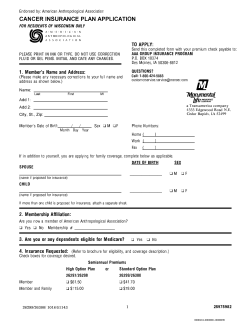
How to Navigate the New Health Insurance Environment
How to Navigate the New Health Insurance Environment - Inside Information Page 1 of 4 How to Navigate the New Health Insurance Environment Posted in Client Articles Tuesday, September 10. 2013 Are you ready for bronze, silver, gold, platinum, the state exchanges and the October 1 enrollment date? The brave new world of health care in the U.S. is about to arrive. The most far-reaching provisions of the Patient Protection and Affordable Care Act--sometimes known as "Obamacare"--will debut on October 1 of this year, when the new health insurance marketplaces (aka "exchanges"), will open for enrollment. The coverage on these plans will start as soon as January 1, 2014, at which time just about everybody (with some interesting exceptions) will be required to have a health insurance policy in place or face tax penalties. For most of us, this is going to be a dramatic and confusing transition period. Here are answers to some of the most frequently-asked questions about the exchanges, coverages and new tax law. Will this make shopping for health insurance easier or harder? Theoretically, it should be much easier--for four reasons. First, all the policies offered in your area--with prices and policy provisions--will be listed side-by-side on the exchange website. (See below for links to these sites.) Before, this "total market" information was available only to health insurance agents. Second, you don't have to search high and low for a policy that allows coverage of your pre-existing conditions, or go through a lot of medical underwriting where the insurance company would look for reasons to charge you more or deny you coverage altogether. Private insurers who participate in the network cannot turn you away or charge you more because you have an illness or preexisting medical condition--and they must cover treatments for those conditions. Third, the policies are now somewhat standardized into four categories, making the comparison of features much less complicated than before. And fourth, if you believe in capitalism, the competition should help drive insurance premiums lower. If one company is offering a better price on a particular policy than all the others, and raking in all the business as a result, other insurance companies will be motivated to drop their prices to be competitive. This isn't a guarantee of lower premiums; initially, some insurance companies will set higher prices until they can get a better handle on claims experience, and some are worried that so many people with big health problems will sign up that it will overload the system. But over the long haul, insurance company profits should be lower than they were before. Are these plans run by the government? No. They are offered by private insurance companies. What's different about the policies offered through the exchanges, compared to what I'm used to? The biggest change is the fact that there is no underwriting or additional charges (or denial) due to pre-existing conditions. The second-biggest is that the plans will be somewhat standardized, which makes it a little bit less complicated to comparison shop. Beyond that, all plans are required to cover a core set of benefits, called "essential health benefits," including preventive and wellness services, chronic disease management, pediatric services, many prescription drugs, rehabilitative services if you get injured, mental health and substance disorder services, maternity and newborn care, hospitalization and emergency services. Unlike the previous environment, no plan will be allowed to have deductibles, co-payments or co-insurance greater than the limits for high-deductible plans (roughly $6,000 for an individual, $12,000 for a family) or impose a limit on lifetime healthcare benefits. Finally, under the exchange system, women cannot be charged higher health insurance premiums than men. So what are the differences between the policies that I'll be choosing from? There will be four basic levels (meaning costs) of policies, which have been dubbed bronze, silver, gold and http://www.bobveres.com/archives/686-How-to-Navigate-the-New-Health-Insurance-Envi... 10/4/2013 How to Navigate the New Health Insurance Environment - Inside Information Page 2 of 4 platinum. If you are not a frequent visitor to the doctor, you might prefer the least expensive option: a bronze plan, which will cover 60% of all health care costs for the average person, leaving you to pay 40%, overall, out-of-pocket. A silver plan covers, on average, 70% of a policyholder's healthcare costs, a gold plan covers 80% and the platinum plan, for people who are frequent medical consumers and can afford the cost, covers 90% of medical expenses, leaving you with 10% out-of-pocket. Young adults under the age of 30 will be able to purchase a catastrophic plan, where they would pay the out-of -pocket costs for all health services except preventive services up to an annual limit of $12,700 (in 2014, rising with inflation thereafter). Suppose I have an HSA plan and make tax-deductible HSA contributions to pay for my health care? A lot of shrill articles on this subject declared HSA plans null and void under the new health reform regime. But they may have overlooked a provision in the new law that clearly states that people using the HSA strategy on or before March 22, 2010 will be grandfathered. Unless they make a major change to their plan that would cancel their grandfathered status, they can continue their HSA strategy indefinitely. Meanwhile, recent calculations appear to allow federally-qualified HSA plans with the highest deductibles (around $6,000) to meet the standards for bronze coverage. Basically that means that, with some tweaking of existing policies, you will probably be able to continue to buy high-deductible catastrophic care insurance through the exchange and continue to make those tax-credited contributions and get tax-deferral on the money invested in the HSA account. However, the Affordable Care Act made one significant change to how HSAs work: the law eliminated the ability to use money in the HSA account to buy over-the-counter drugs. You don't want to make this mistake and write a check to the pharmacy for the drug purchase. The early withdrawal penalty for taking money out of the account for reasons other than to pay medical bills, for anybody under age 65, is 20% of the withdrawal amount. Add in the tax penalties and that bottle of aspirin can get very expensive. How do I compare the plans and buy them? You will be able to compare plans (and, most importantly, costs) side-by-side on the web portal of your state exchange--or, if your state has not created an exchange, then through a federal web portal (see below). There will also be toll-free consumer assistance hotlines that can be found on the exchange website. When you apply for coverage in the exchange, you'll need to provide your Social Security number, the name of the employer of each member of your household who needs coverage and their income, plus the policy numbers for any current health insurance plans covering members of your household. You will also need to provide information on any health insurance policy you and/or a member of your household is eligible for, even if you aren't currently participating in the plan. What else should I be comparing? Look at whether the plan lets you visit the doctors and hospitals that you're currently comfortable with. Many of the policies are going to be network-dependent, a fancy word that means you will be confined to working with their preferred provider professionals and facilities. How workable is this exchange idea, anyway? There have been a lot of commentaries on both sides of the political spectrum, which might lead you to believe that the exchange concept was conceived in heaven or hell. But one thing to remember is that Medicare has operated as an exchange (although it isn't called that) for decades. Each Medicare-eligible person picks from a number of plans, more in some states than in others, each with a variety of benefits. So to the extent that seniors are happy with their Medicare coverage, there is at least one significant example that the concept can work effectively. Of course, consultants will tell you that most seniors tend to pay more in out-of-pocket expenses under Medicare than necessary, because they don't know how to match up their personal health profile with the right package. That may also prove to be true with the exchanges. http://www.bobveres.com/archives/686-How-to-Navigate-the-New-Health-Insurance-Envi... 10/4/2013 How to Navigate the New Health Insurance Environment - Inside Information Page 3 of 4 Which states have their own state exchanges? You can put in the name of your state on a very helpful website set up by the government: www.HealthCare.gov, and get links to the state exchanges--plus a lot of other explanatory information. Exchanges have been set up in: California (Covered California; http://www.coveredca.com/), Colorado (Connect for Health Colorado; http://www.connectforhealthco.com/), Connecticut (Access Health CT; http://www.accesshealthct.com/), the District of Columbia (DC Health Link; http://dchealthlink.com/), Hawaii (Hawaii Health Connector; http://www.hawaiihealthconnector.com/), Idaho (Your Health Idaho; http://www.yourhealthidaho.org/), Kentucky (Kentucky Health Benefit Exchange; http://kynect.ky.gov/), Maryland (Maryland Health Connection; http://www.marylandhealthconnection.gov/), Massachusetts (The Massachusetts Health Connector; https://www.mahealthconnector.org/portal/site/connector), Minnesota (MNsure; http://mn.gov/hix/), Nevada (The Nevada Health Link; http://www.nevadahealthlink.com/), New Mexico (The Health Insurance Marketplace; http://www.nmhix.com/), New York (The New York State of Health; http://healthbenefitexchange.ny.gov/), Oregon (Cover Oregon; http://www.coveroregon.com/), Rhode Island (HealthSource RI; http://www.healthsourceri.com/), Vermont (Vermont Health Connect; http://healthconnect.vermont.gov/) and Washington (Washington Healthplanfinder; http://www.wahealthplanfinder.org/). Utah has an exchange for small businesses and employees (Your Small Business Health Options Program; http://www.avenueh.com/) but if you want to shop for individual coverage in Utah, or any coverage in all other states, you go to the government's website at: http://www.HealthCare.gov. Am I required to buy one of those policies? Yes and no. If you're covered by Medicare, Medicaid, TRICARE, the veteran's health program or a plan offered by your employer, then the requirement to have health insurance is satisfied. You are not required to buy health insurance if your family income is below $10,000 (individual) or $20,000 (joint). Otherwise, the answer is still no, but you have to pay a tax penalty if you are not covered by health insurance. What kind of a penalty? In 2014, that penalty is $95 per adult and $47.50 per child up to $285 for a family, or 1% of family income above the aforementioned thresholds ($10,000 or $20,000)--whichever is greater. For a family with more than $900,000 in income, the penalty will be higher than the cost of a typical silver-level plan; below that, the decision not to be covered becomes more complicated. The penalty steps up in subsequent years. In 2015, it jumps to $325 per uninsured adult and $162.50 per uninsured child, up to $975 for a family, or 2% of family income above the thresholds--whichever is greater. In http://www.bobveres.com/archives/686-How-to-Navigate-the-New-Health-Insurance-Envi... 10/4/2013 How to Navigate the New Health Insurance Environment - Inside Information Page 4 of 4 2016 and thereafter, the penalty steepens to $695 per uninsured adult, $347.50 per uninsured child or 2.5% of family income above the thresholds. In all cases, the penalty is prorated by the number of months without coverage. How will the government know whether I have health coverage or not? Health insurance plans will provide documents to the people they insure, that will be used to prove they have the minimum coverage required by law. Would it make sense to drop the coverage I get from my employer and buy one of these new policies? It depends on what you're paying now, and what you're getting--but in most cases, the answer is no. In most job-based health insurance plans, your employer pays a portion of your premiums. If you choose a plan from the exchange, your employer does not need to make a contribution to your premiums. Does the government subsidize some of the cost of health insurance premiums? If so, for who, and how much? An estimated two-thirds of the American population will receive some form of subsidy. You qualify if your income is under four times (400%) the federal poverty level--which is about $88,000 a year for a family of four. If the family income falls under 250% of the federal poverty level ($27,000 for an individual; $55,000 for a family of four), then that family is eligible for "cost-sharing credits" which help defray co-payments, coinsurance and deductible--plus premium assistance on the policy itself. Above that 250% threshold, up to 400%, families are eligible on a sliding scale for premium assistance. The Kaiser-Permanente organization has created a calculator telling you what credits and assistance you qualify for: http://kff.org/interactive/subsidy-calculator/. A family of four with two children, where nobody uses tobacco, earning $90,000 a year in 2014 dollars (382% of the poverty level), falls right on the threshold. An unsubsidized silver plan would cost $9,869, but the rules only require a person in this income category to pay a maximum of 9.5% of income for health insurance, so the government will issue a tax credit of $1,319 a year, dropping the actual premium price to $8,550. The same household with an income of $50,000 is only required to pay 6.73% of its income, which means it would receive a government subsidy of $6,504--66% of the total premium expenses. All subsidies are based on the premium for the silver plans. If an individual receiving the subsidy wants to purchase a gold or platinum plan, he or she will need to pay the difference between the premium credit amount and the cost of the more expensive plan. When should I do my insurance shopping? Sooner is better than later. As the January 1 deadline approaches, you can expect that suddenly many millions of people will suddenly decide they had better get coverage. The result could be a lot of confusion around the end of the year that you would be better off avoiding. Trackbacks No Trackbacks Comments No comments The author does not allow comments to this entry http://www.bobveres.com/archives/686-How-to-Navigate-the-New-Health-Insurance-Envi... 10/4/2013
© Copyright 2025





















